Recruitment Skills in the Hospitality Industry: A Hilton Case Study
VerifiedAdded on 2023/02/02
|9
|2439
|99
Report
AI Summary
This report provides an overview of the hospitality industry, using the Hilton Hotel as a case study. It explores the diverse types of businesses within the industry, including food and beverage, travel and tourism, and lodging, and discusses their contribution to local, national, and international economies. The report also evaluates the impact of global growth, franchising, and licensing agreements on the industry's development. Furthermore, it examines various operational and functional departments within the hospitality sector, detailing different employment roles and identifying skill gaps and shortages. The analysis extends to how these skill gaps impact hospitality businesses and potential solutions for improvement, emphasizing the importance of training and development to enhance employee skills and overall business performance. The report concludes by summarizing the key findings and highlighting the importance of addressing skill gaps to ensure the long-term success and sustainability of hospitality businesses.
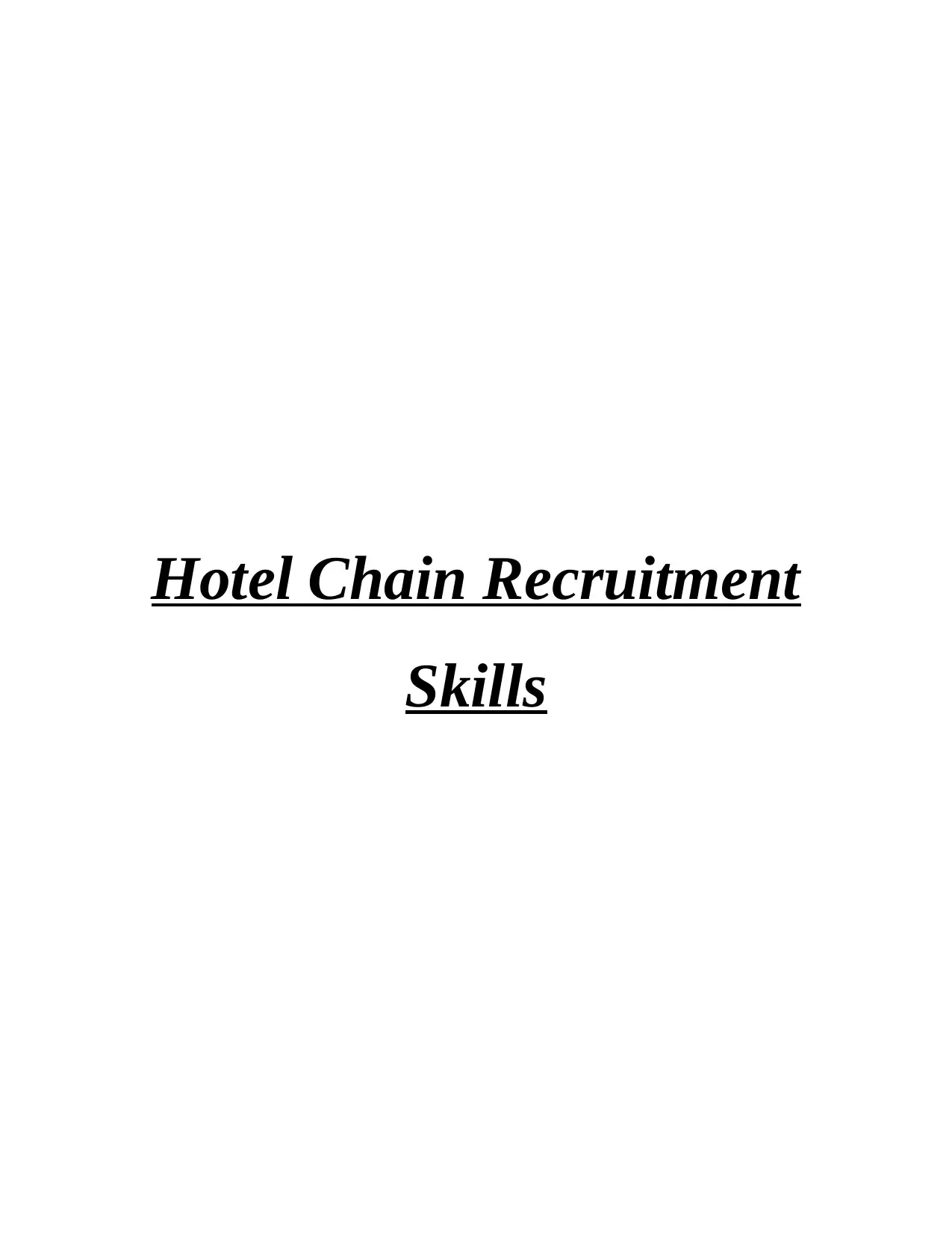
Hotel Chain Recruitment
Skills
Skills
Paraphrase This Document
Need a fresh take? Get an instant paraphrase of this document with our AI Paraphraser
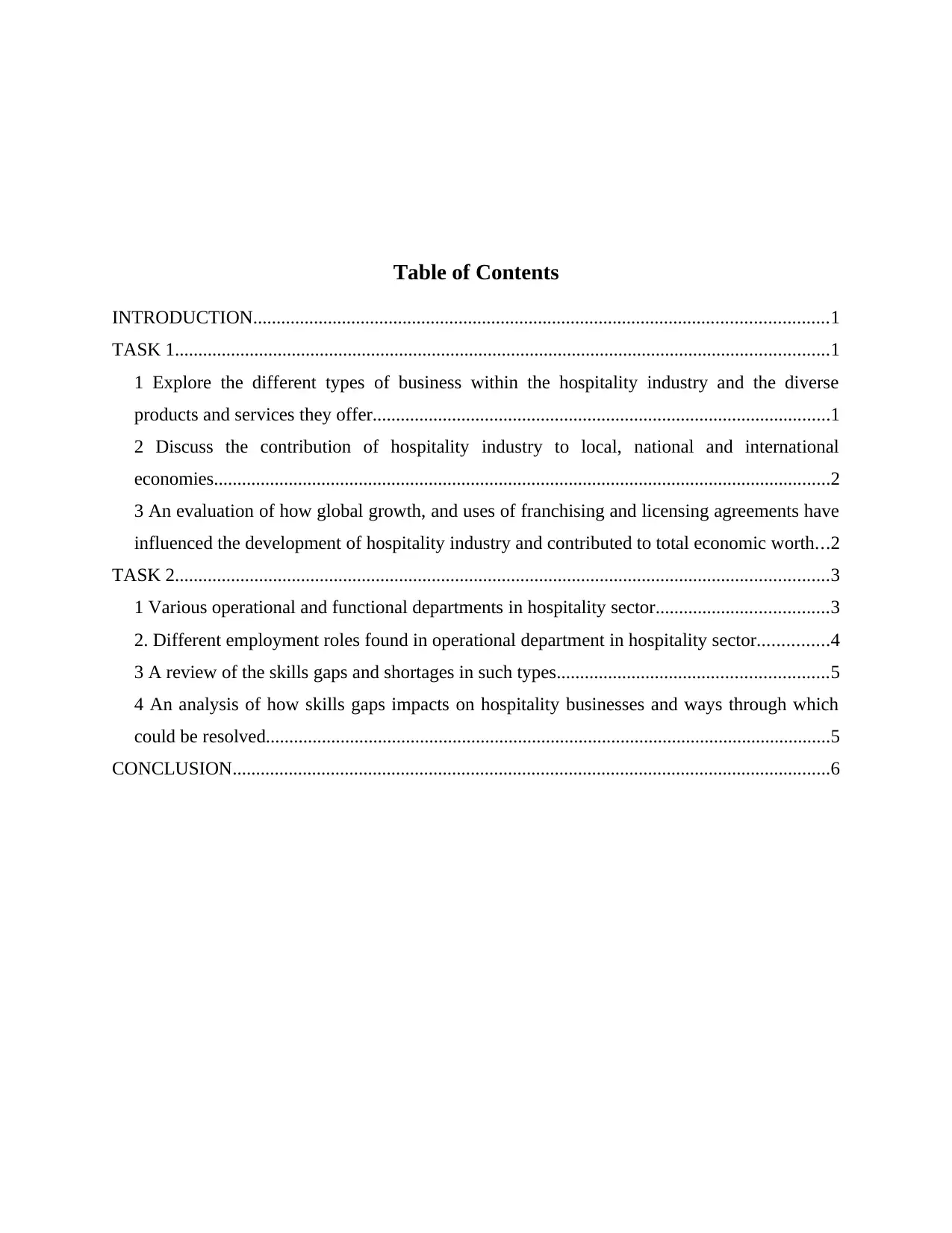
Table of Contents
INTRODUCTION...........................................................................................................................1
TASK 1............................................................................................................................................1
1 Explore the different types of business within the hospitality industry and the diverse
products and services they offer..................................................................................................1
2 Discuss the contribution of hospitality industry to local, national and international
economies....................................................................................................................................2
3 An evaluation of how global growth, and uses of franchising and licensing agreements have
influenced the development of hospitality industry and contributed to total economic worth...2
TASK 2............................................................................................................................................3
1 Various operational and functional departments in hospitality sector.....................................3
2. Different employment roles found in operational department in hospitality sector...............4
3 A review of the skills gaps and shortages in such types..........................................................5
4 An analysis of how skills gaps impacts on hospitality businesses and ways through which
could be resolved.........................................................................................................................5
CONCLUSION................................................................................................................................6
INTRODUCTION...........................................................................................................................1
TASK 1............................................................................................................................................1
1 Explore the different types of business within the hospitality industry and the diverse
products and services they offer..................................................................................................1
2 Discuss the contribution of hospitality industry to local, national and international
economies....................................................................................................................................2
3 An evaluation of how global growth, and uses of franchising and licensing agreements have
influenced the development of hospitality industry and contributed to total economic worth...2
TASK 2............................................................................................................................................3
1 Various operational and functional departments in hospitality sector.....................................3
2. Different employment roles found in operational department in hospitality sector...............4
3 A review of the skills gaps and shortages in such types..........................................................5
4 An analysis of how skills gaps impacts on hospitality businesses and ways through which
could be resolved.........................................................................................................................5
CONCLUSION................................................................................................................................6
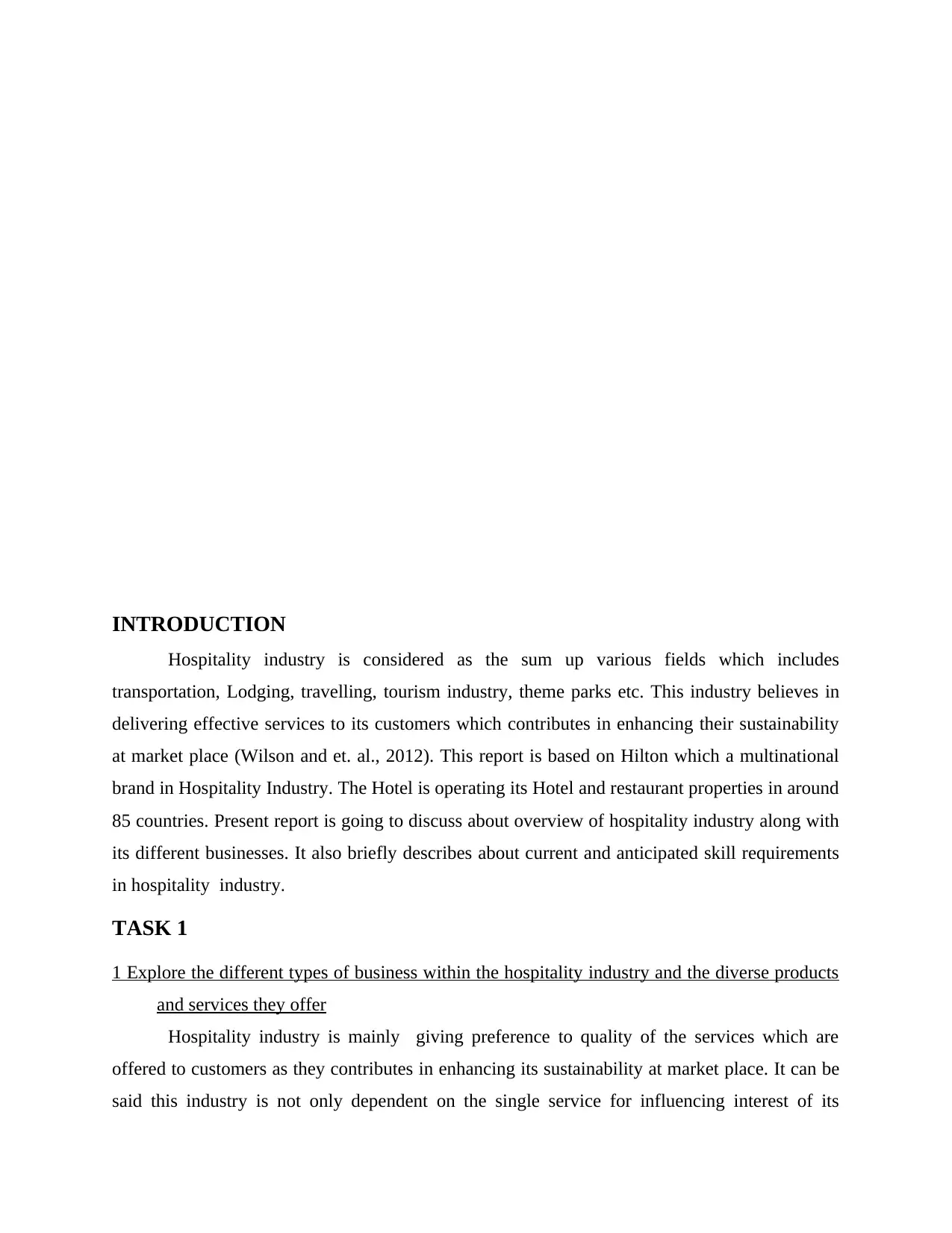
INTRODUCTION
Hospitality industry is considered as the sum up various fields which includes
transportation, Lodging, travelling, tourism industry, theme parks etc. This industry believes in
delivering effective services to its customers which contributes in enhancing their sustainability
at market place (Wilson and et. al., 2012). This report is based on Hilton which a multinational
brand in Hospitality Industry. The Hotel is operating its Hotel and restaurant properties in around
85 countries. Present report is going to discuss about overview of hospitality industry along with
its different businesses. It also briefly describes about current and anticipated skill requirements
in hospitality industry.
TASK 1
1 Explore the different types of business within the hospitality industry and the diverse products
and services they offer
Hospitality industry is mainly giving preference to quality of the services which are
offered to customers as they contributes in enhancing its sustainability at market place. It can be
said this industry is not only dependent on the single service for influencing interest of its
Hospitality industry is considered as the sum up various fields which includes
transportation, Lodging, travelling, tourism industry, theme parks etc. This industry believes in
delivering effective services to its customers which contributes in enhancing their sustainability
at market place (Wilson and et. al., 2012). This report is based on Hilton which a multinational
brand in Hospitality Industry. The Hotel is operating its Hotel and restaurant properties in around
85 countries. Present report is going to discuss about overview of hospitality industry along with
its different businesses. It also briefly describes about current and anticipated skill requirements
in hospitality industry.
TASK 1
1 Explore the different types of business within the hospitality industry and the diverse products
and services they offer
Hospitality industry is mainly giving preference to quality of the services which are
offered to customers as they contributes in enhancing its sustainability at market place. It can be
said this industry is not only dependent on the single service for influencing interest of its
⊘ This is a preview!⊘
Do you want full access?
Subscribe today to unlock all pages.

Trusted by 1+ million students worldwide
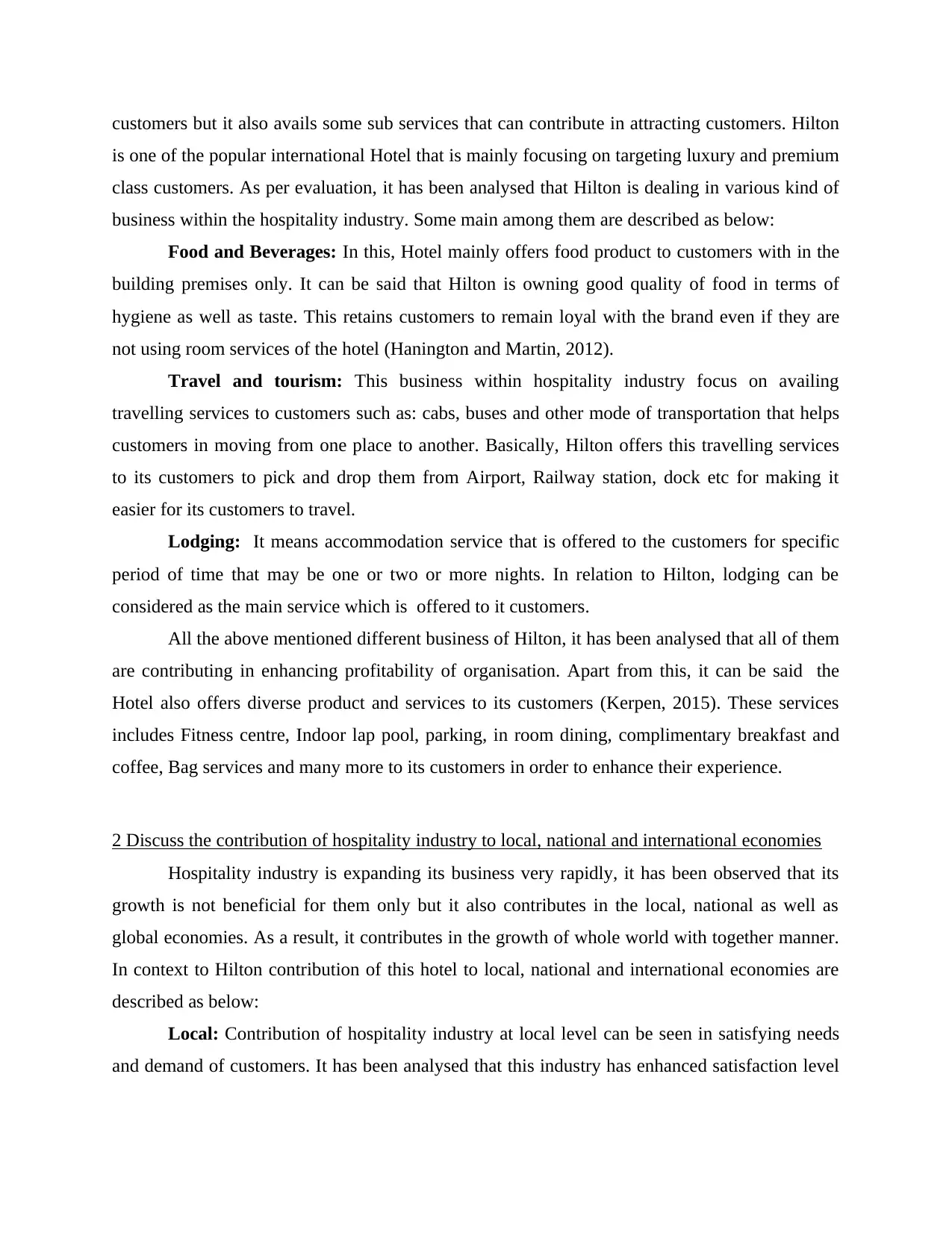
customers but it also avails some sub services that can contribute in attracting customers. Hilton
is one of the popular international Hotel that is mainly focusing on targeting luxury and premium
class customers. As per evaluation, it has been analysed that Hilton is dealing in various kind of
business within the hospitality industry. Some main among them are described as below:
Food and Beverages: In this, Hotel mainly offers food product to customers with in the
building premises only. It can be said that Hilton is owning good quality of food in terms of
hygiene as well as taste. This retains customers to remain loyal with the brand even if they are
not using room services of the hotel (Hanington and Martin, 2012).
Travel and tourism: This business within hospitality industry focus on availing
travelling services to customers such as: cabs, buses and other mode of transportation that helps
customers in moving from one place to another. Basically, Hilton offers this travelling services
to its customers to pick and drop them from Airport, Railway station, dock etc for making it
easier for its customers to travel.
Lodging: It means accommodation service that is offered to the customers for specific
period of time that may be one or two or more nights. In relation to Hilton, lodging can be
considered as the main service which is offered to it customers.
All the above mentioned different business of Hilton, it has been analysed that all of them
are contributing in enhancing profitability of organisation. Apart from this, it can be said the
Hotel also offers diverse product and services to its customers (Kerpen, 2015). These services
includes Fitness centre, Indoor lap pool, parking, in room dining, complimentary breakfast and
coffee, Bag services and many more to its customers in order to enhance their experience.
2 Discuss the contribution of hospitality industry to local, national and international economies
Hospitality industry is expanding its business very rapidly, it has been observed that its
growth is not beneficial for them only but it also contributes in the local, national as well as
global economies. As a result, it contributes in the growth of whole world with together manner.
In context to Hilton contribution of this hotel to local, national and international economies are
described as below:
Local: Contribution of hospitality industry at local level can be seen in satisfying needs
and demand of customers. It has been analysed that this industry has enhanced satisfaction level
is one of the popular international Hotel that is mainly focusing on targeting luxury and premium
class customers. As per evaluation, it has been analysed that Hilton is dealing in various kind of
business within the hospitality industry. Some main among them are described as below:
Food and Beverages: In this, Hotel mainly offers food product to customers with in the
building premises only. It can be said that Hilton is owning good quality of food in terms of
hygiene as well as taste. This retains customers to remain loyal with the brand even if they are
not using room services of the hotel (Hanington and Martin, 2012).
Travel and tourism: This business within hospitality industry focus on availing
travelling services to customers such as: cabs, buses and other mode of transportation that helps
customers in moving from one place to another. Basically, Hilton offers this travelling services
to its customers to pick and drop them from Airport, Railway station, dock etc for making it
easier for its customers to travel.
Lodging: It means accommodation service that is offered to the customers for specific
period of time that may be one or two or more nights. In relation to Hilton, lodging can be
considered as the main service which is offered to it customers.
All the above mentioned different business of Hilton, it has been analysed that all of them
are contributing in enhancing profitability of organisation. Apart from this, it can be said the
Hotel also offers diverse product and services to its customers (Kerpen, 2015). These services
includes Fitness centre, Indoor lap pool, parking, in room dining, complimentary breakfast and
coffee, Bag services and many more to its customers in order to enhance their experience.
2 Discuss the contribution of hospitality industry to local, national and international economies
Hospitality industry is expanding its business very rapidly, it has been observed that its
growth is not beneficial for them only but it also contributes in the local, national as well as
global economies. As a result, it contributes in the growth of whole world with together manner.
In context to Hilton contribution of this hotel to local, national and international economies are
described as below:
Local: Contribution of hospitality industry at local level can be seen in satisfying needs
and demand of customers. It has been analysed that this industry has enhanced satisfaction level
Paraphrase This Document
Need a fresh take? Get an instant paraphrase of this document with our AI Paraphraser
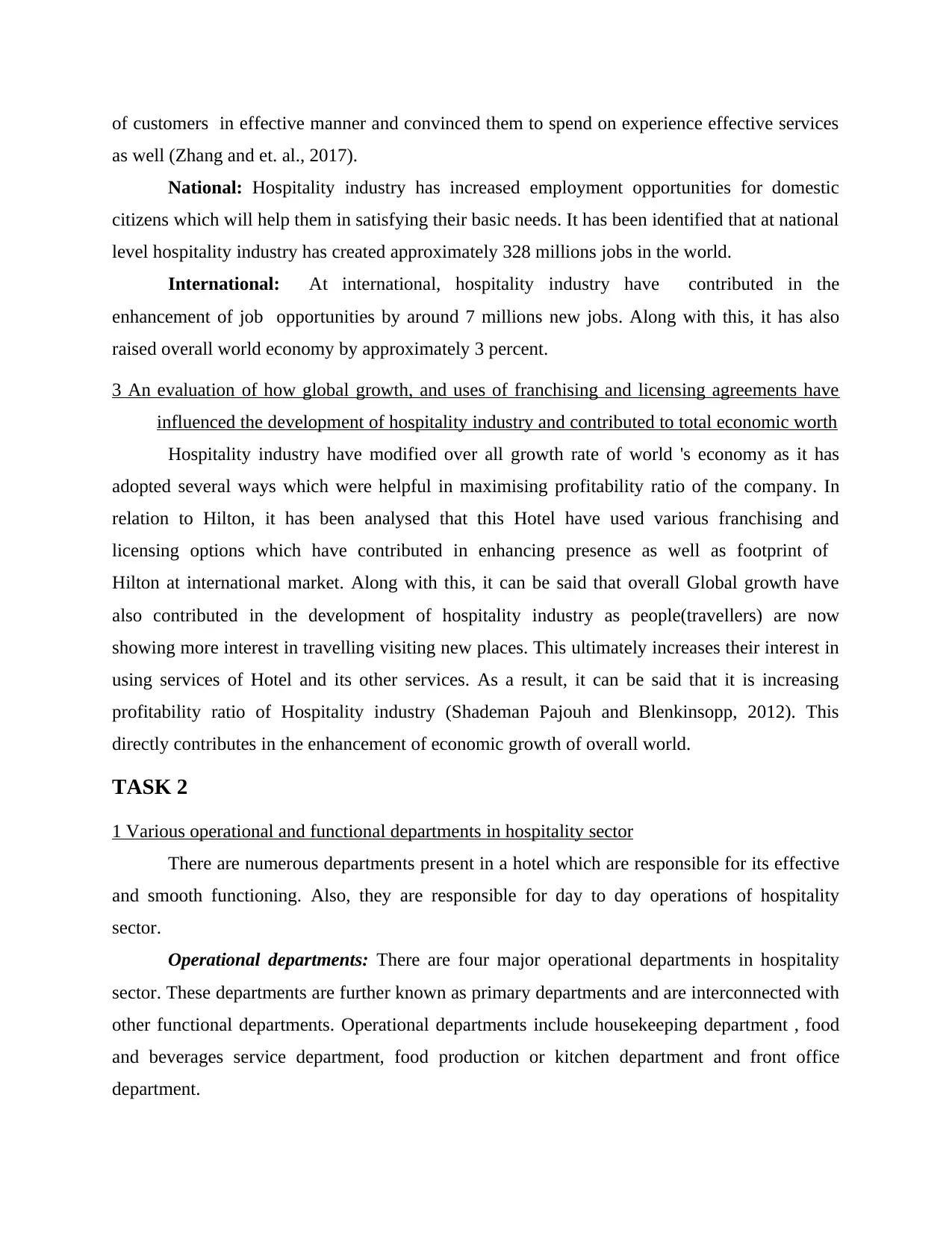
of customers in effective manner and convinced them to spend on experience effective services
as well (Zhang and et. al., 2017).
National: Hospitality industry has increased employment opportunities for domestic
citizens which will help them in satisfying their basic needs. It has been identified that at national
level hospitality industry has created approximately 328 millions jobs in the world.
International: At international, hospitality industry have contributed in the
enhancement of job opportunities by around 7 millions new jobs. Along with this, it has also
raised overall world economy by approximately 3 percent.
3 An evaluation of how global growth, and uses of franchising and licensing agreements have
influenced the development of hospitality industry and contributed to total economic worth
Hospitality industry have modified over all growth rate of world 's economy as it has
adopted several ways which were helpful in maximising profitability ratio of the company. In
relation to Hilton, it has been analysed that this Hotel have used various franchising and
licensing options which have contributed in enhancing presence as well as footprint of
Hilton at international market. Along with this, it can be said that overall Global growth have
also contributed in the development of hospitality industry as people(travellers) are now
showing more interest in travelling visiting new places. This ultimately increases their interest in
using services of Hotel and its other services. As a result, it can be said that it is increasing
profitability ratio of Hospitality industry (Shademan Pajouh and Blenkinsopp, 2012). This
directly contributes in the enhancement of economic growth of overall world.
TASK 2
1 Various operational and functional departments in hospitality sector
There are numerous departments present in a hotel which are responsible for its effective
and smooth functioning. Also, they are responsible for day to day operations of hospitality
sector.
Operational departments: There are four major operational departments in hospitality
sector. These departments are further known as primary departments and are interconnected with
other functional departments. Operational departments include housekeeping department , food
and beverages service department, food production or kitchen department and front office
department.
as well (Zhang and et. al., 2017).
National: Hospitality industry has increased employment opportunities for domestic
citizens which will help them in satisfying their basic needs. It has been identified that at national
level hospitality industry has created approximately 328 millions jobs in the world.
International: At international, hospitality industry have contributed in the
enhancement of job opportunities by around 7 millions new jobs. Along with this, it has also
raised overall world economy by approximately 3 percent.
3 An evaluation of how global growth, and uses of franchising and licensing agreements have
influenced the development of hospitality industry and contributed to total economic worth
Hospitality industry have modified over all growth rate of world 's economy as it has
adopted several ways which were helpful in maximising profitability ratio of the company. In
relation to Hilton, it has been analysed that this Hotel have used various franchising and
licensing options which have contributed in enhancing presence as well as footprint of
Hilton at international market. Along with this, it can be said that overall Global growth have
also contributed in the development of hospitality industry as people(travellers) are now
showing more interest in travelling visiting new places. This ultimately increases their interest in
using services of Hotel and its other services. As a result, it can be said that it is increasing
profitability ratio of Hospitality industry (Shademan Pajouh and Blenkinsopp, 2012). This
directly contributes in the enhancement of economic growth of overall world.
TASK 2
1 Various operational and functional departments in hospitality sector
There are numerous departments present in a hotel which are responsible for its effective
and smooth functioning. Also, they are responsible for day to day operations of hospitality
sector.
Operational departments: There are four major operational departments in hospitality
sector. These departments are further known as primary departments and are interconnected with
other functional departments. Operational departments include housekeeping department , food
and beverages service department, food production or kitchen department and front office
department.
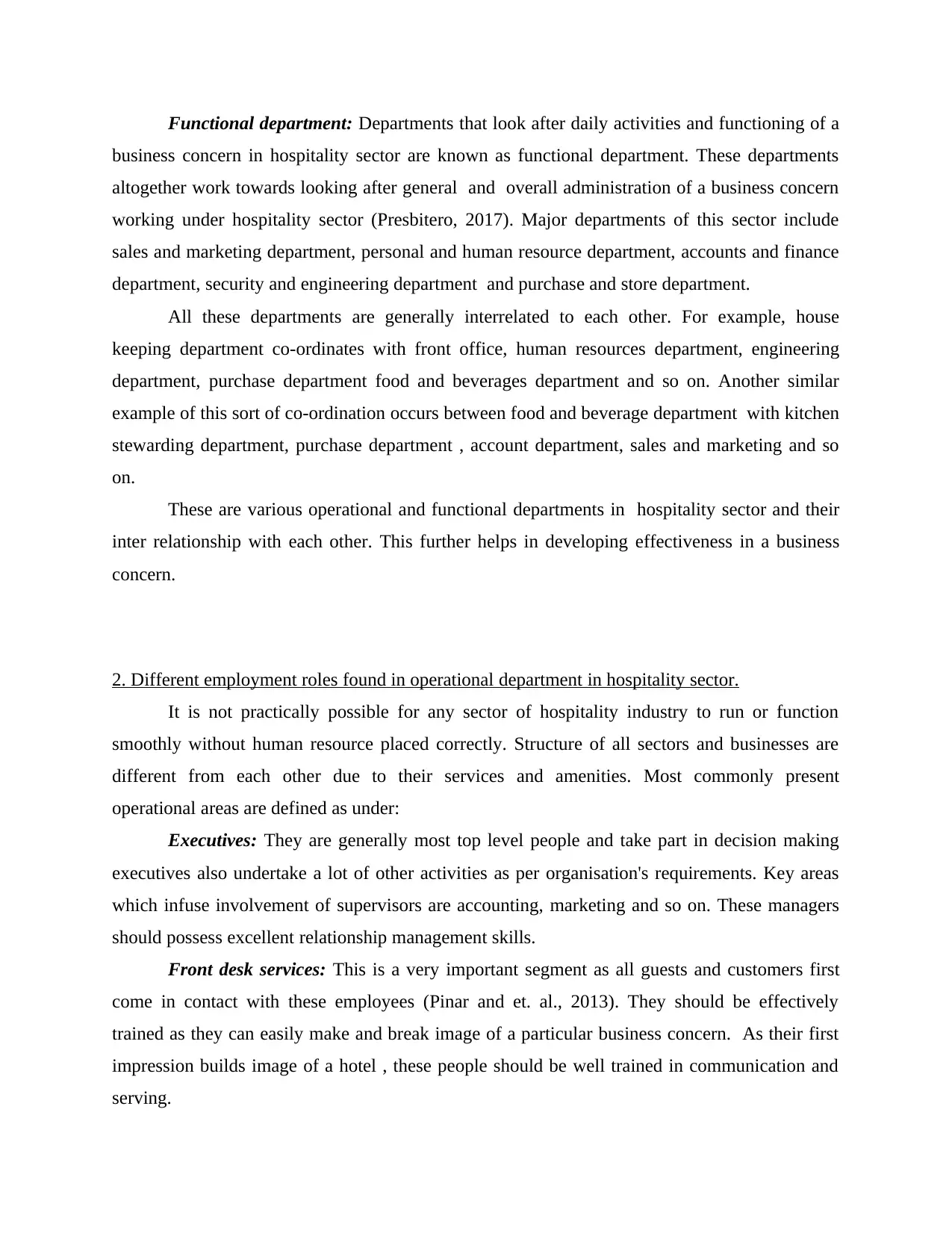
Functional department: Departments that look after daily activities and functioning of a
business concern in hospitality sector are known as functional department. These departments
altogether work towards looking after general and overall administration of a business concern
working under hospitality sector (Presbitero, 2017). Major departments of this sector include
sales and marketing department, personal and human resource department, accounts and finance
department, security and engineering department and purchase and store department.
All these departments are generally interrelated to each other. For example, house
keeping department co-ordinates with front office, human resources department, engineering
department, purchase department food and beverages department and so on. Another similar
example of this sort of co-ordination occurs between food and beverage department with kitchen
stewarding department, purchase department , account department, sales and marketing and so
on.
These are various operational and functional departments in hospitality sector and their
inter relationship with each other. This further helps in developing effectiveness in a business
concern.
2. Different employment roles found in operational department in hospitality sector.
It is not practically possible for any sector of hospitality industry to run or function
smoothly without human resource placed correctly. Structure of all sectors and businesses are
different from each other due to their services and amenities. Most commonly present
operational areas are defined as under:
Executives: They are generally most top level people and take part in decision making
executives also undertake a lot of other activities as per organisation's requirements. Key areas
which infuse involvement of supervisors are accounting, marketing and so on. These managers
should possess excellent relationship management skills.
Front desk services: This is a very important segment as all guests and customers first
come in contact with these employees (Pinar and et. al., 2013). They should be effectively
trained as they can easily make and break image of a particular business concern. As their first
impression builds image of a hotel , these people should be well trained in communication and
serving.
business concern in hospitality sector are known as functional department. These departments
altogether work towards looking after general and overall administration of a business concern
working under hospitality sector (Presbitero, 2017). Major departments of this sector include
sales and marketing department, personal and human resource department, accounts and finance
department, security and engineering department and purchase and store department.
All these departments are generally interrelated to each other. For example, house
keeping department co-ordinates with front office, human resources department, engineering
department, purchase department food and beverages department and so on. Another similar
example of this sort of co-ordination occurs between food and beverage department with kitchen
stewarding department, purchase department , account department, sales and marketing and so
on.
These are various operational and functional departments in hospitality sector and their
inter relationship with each other. This further helps in developing effectiveness in a business
concern.
2. Different employment roles found in operational department in hospitality sector.
It is not practically possible for any sector of hospitality industry to run or function
smoothly without human resource placed correctly. Structure of all sectors and businesses are
different from each other due to their services and amenities. Most commonly present
operational areas are defined as under:
Executives: They are generally most top level people and take part in decision making
executives also undertake a lot of other activities as per organisation's requirements. Key areas
which infuse involvement of supervisors are accounting, marketing and so on. These managers
should possess excellent relationship management skills.
Front desk services: This is a very important segment as all guests and customers first
come in contact with these employees (Pinar and et. al., 2013). They should be effectively
trained as they can easily make and break image of a particular business concern. As their first
impression builds image of a hotel , these people should be well trained in communication and
serving.
⊘ This is a preview!⊘
Do you want full access?
Subscribe today to unlock all pages.

Trusted by 1+ million students worldwide
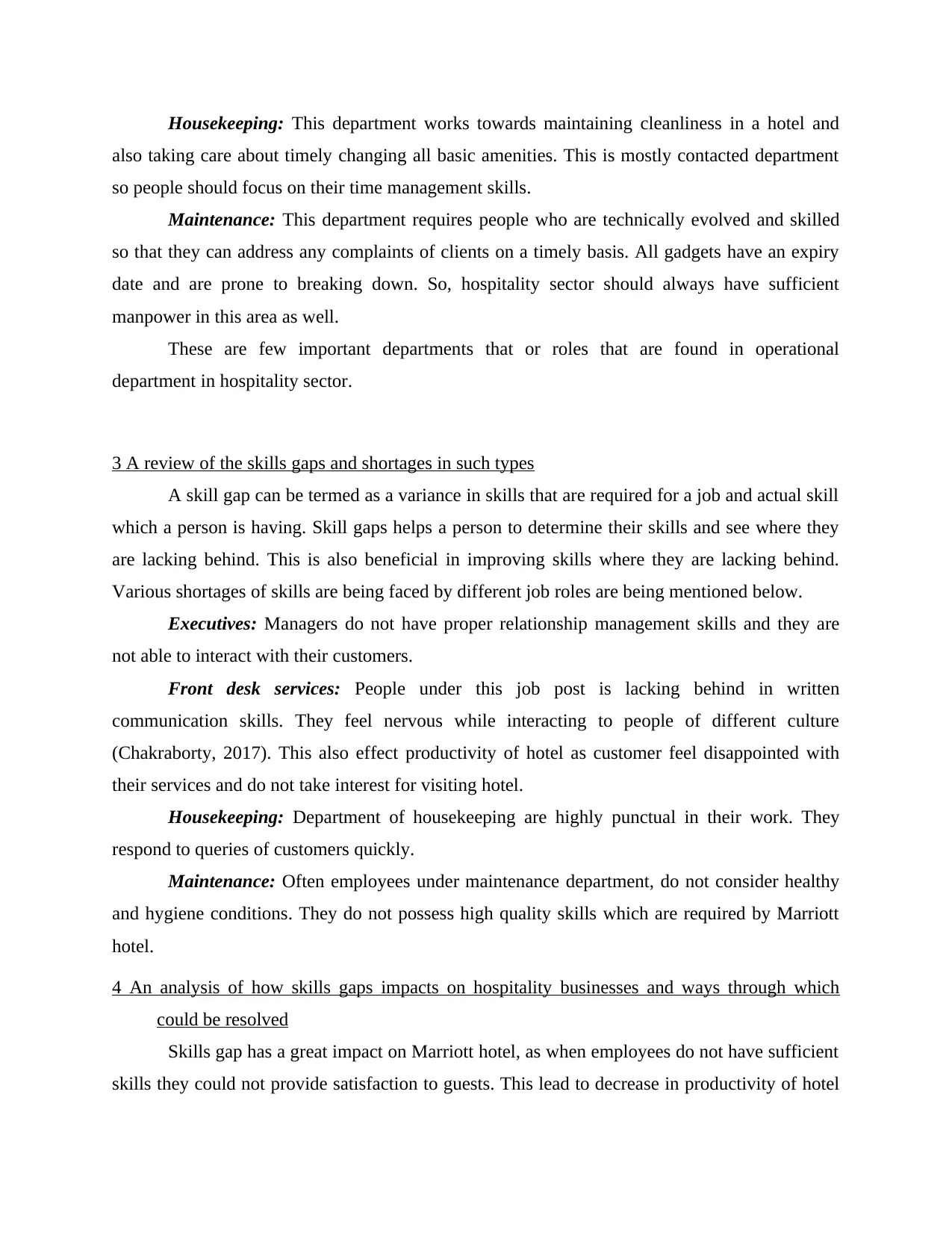
Housekeeping: This department works towards maintaining cleanliness in a hotel and
also taking care about timely changing all basic amenities. This is mostly contacted department
so people should focus on their time management skills.
Maintenance: This department requires people who are technically evolved and skilled
so that they can address any complaints of clients on a timely basis. All gadgets have an expiry
date and are prone to breaking down. So, hospitality sector should always have sufficient
manpower in this area as well.
These are few important departments that or roles that are found in operational
department in hospitality sector.
3 A review of the skills gaps and shortages in such types
A skill gap can be termed as a variance in skills that are required for a job and actual skill
which a person is having. Skill gaps helps a person to determine their skills and see where they
are lacking behind. This is also beneficial in improving skills where they are lacking behind.
Various shortages of skills are being faced by different job roles are being mentioned below.
Executives: Managers do not have proper relationship management skills and they are
not able to interact with their customers.
Front desk services: People under this job post is lacking behind in written
communication skills. They feel nervous while interacting to people of different culture
(Chakraborty, 2017). This also effect productivity of hotel as customer feel disappointed with
their services and do not take interest for visiting hotel.
Housekeeping: Department of housekeeping are highly punctual in their work. They
respond to queries of customers quickly.
Maintenance: Often employees under maintenance department, do not consider healthy
and hygiene conditions. They do not possess high quality skills which are required by Marriott
hotel.
4 An analysis of how skills gaps impacts on hospitality businesses and ways through which
could be resolved
Skills gap has a great impact on Marriott hotel, as when employees do not have sufficient
skills they could not provide satisfaction to guests. This lead to decrease in productivity of hotel
also taking care about timely changing all basic amenities. This is mostly contacted department
so people should focus on their time management skills.
Maintenance: This department requires people who are technically evolved and skilled
so that they can address any complaints of clients on a timely basis. All gadgets have an expiry
date and are prone to breaking down. So, hospitality sector should always have sufficient
manpower in this area as well.
These are few important departments that or roles that are found in operational
department in hospitality sector.
3 A review of the skills gaps and shortages in such types
A skill gap can be termed as a variance in skills that are required for a job and actual skill
which a person is having. Skill gaps helps a person to determine their skills and see where they
are lacking behind. This is also beneficial in improving skills where they are lacking behind.
Various shortages of skills are being faced by different job roles are being mentioned below.
Executives: Managers do not have proper relationship management skills and they are
not able to interact with their customers.
Front desk services: People under this job post is lacking behind in written
communication skills. They feel nervous while interacting to people of different culture
(Chakraborty, 2017). This also effect productivity of hotel as customer feel disappointed with
their services and do not take interest for visiting hotel.
Housekeeping: Department of housekeeping are highly punctual in their work. They
respond to queries of customers quickly.
Maintenance: Often employees under maintenance department, do not consider healthy
and hygiene conditions. They do not possess high quality skills which are required by Marriott
hotel.
4 An analysis of how skills gaps impacts on hospitality businesses and ways through which
could be resolved
Skills gap has a great impact on Marriott hotel, as when employees do not have sufficient
skills they could not provide satisfaction to guests. This lead to decrease in productivity of hotel
Paraphrase This Document
Need a fresh take? Get an instant paraphrase of this document with our AI Paraphraser
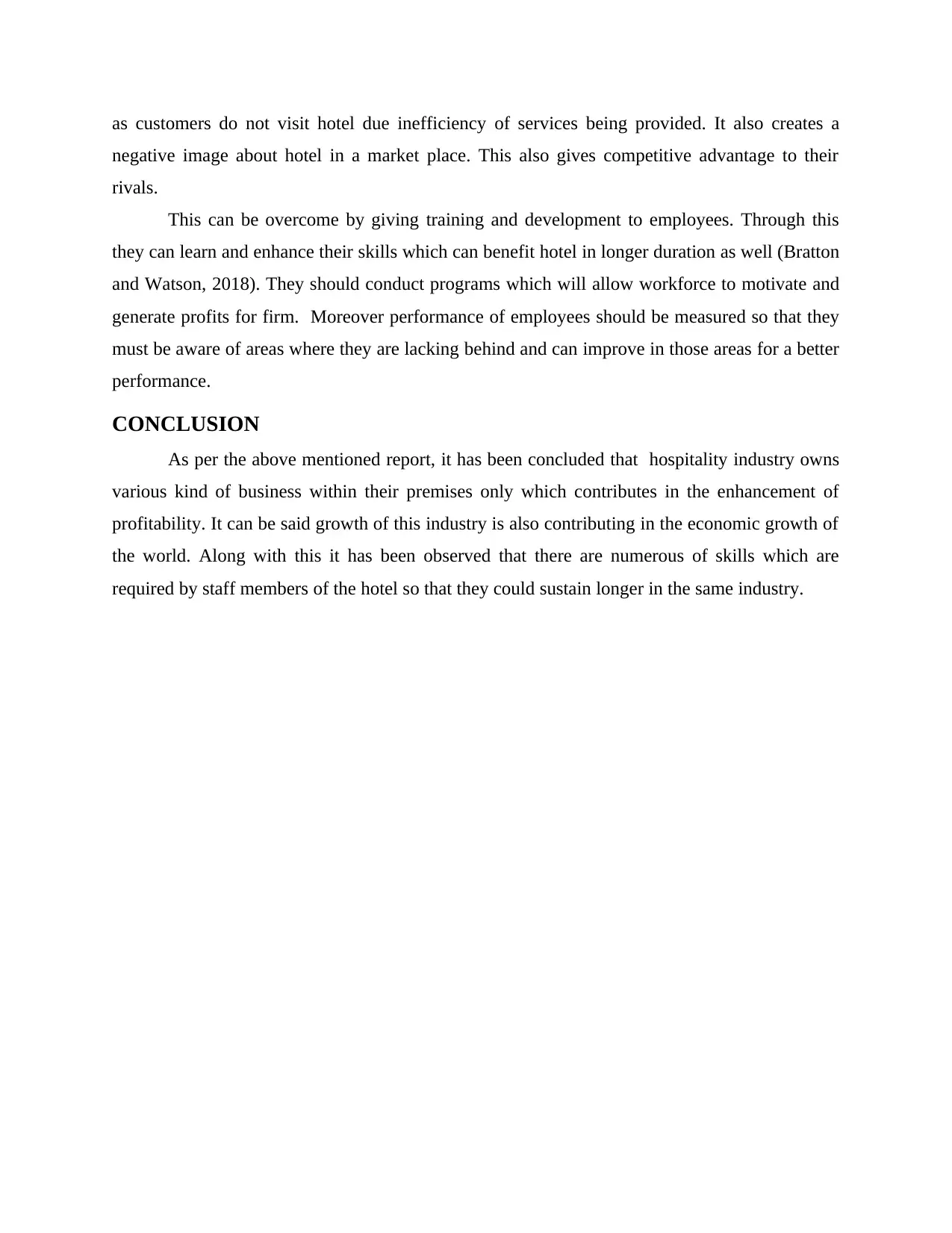
as customers do not visit hotel due inefficiency of services being provided. It also creates a
negative image about hotel in a market place. This also gives competitive advantage to their
rivals.
This can be overcome by giving training and development to employees. Through this
they can learn and enhance their skills which can benefit hotel in longer duration as well (Bratton
and Watson, 2018). They should conduct programs which will allow workforce to motivate and
generate profits for firm. Moreover performance of employees should be measured so that they
must be aware of areas where they are lacking behind and can improve in those areas for a better
performance.
CONCLUSION
As per the above mentioned report, it has been concluded that hospitality industry owns
various kind of business within their premises only which contributes in the enhancement of
profitability. It can be said growth of this industry is also contributing in the economic growth of
the world. Along with this it has been observed that there are numerous of skills which are
required by staff members of the hotel so that they could sustain longer in the same industry.
negative image about hotel in a market place. This also gives competitive advantage to their
rivals.
This can be overcome by giving training and development to employees. Through this
they can learn and enhance their skills which can benefit hotel in longer duration as well (Bratton
and Watson, 2018). They should conduct programs which will allow workforce to motivate and
generate profits for firm. Moreover performance of employees should be measured so that they
must be aware of areas where they are lacking behind and can improve in those areas for a better
performance.
CONCLUSION
As per the above mentioned report, it has been concluded that hospitality industry owns
various kind of business within their premises only which contributes in the enhancement of
profitability. It can be said growth of this industry is also contributing in the economic growth of
the world. Along with this it has been observed that there are numerous of skills which are
required by staff members of the hotel so that they could sustain longer in the same industry.
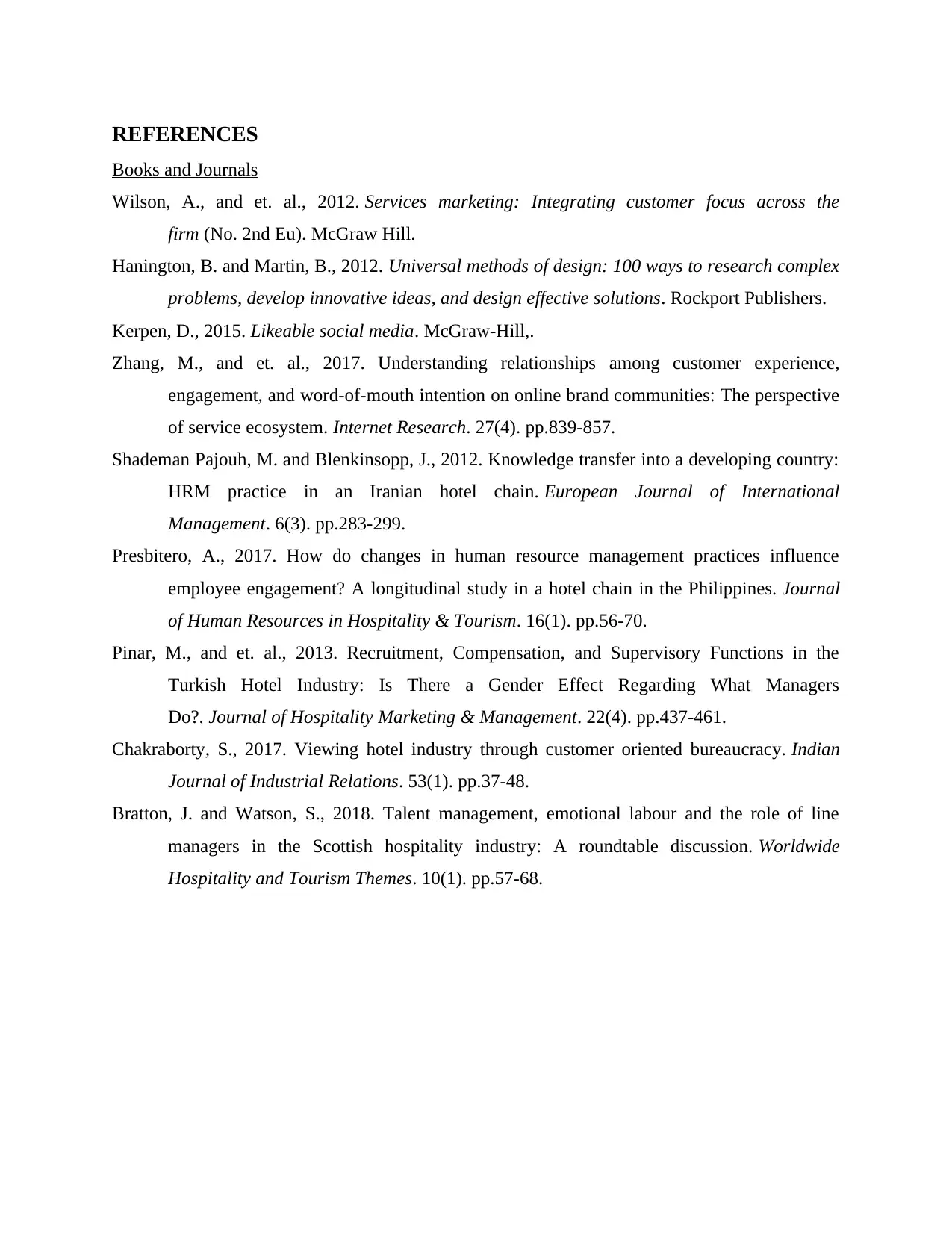
REFERENCES
Books and Journals
Wilson, A., and et. al., 2012. Services marketing: Integrating customer focus across the
firm (No. 2nd Eu). McGraw Hill.
Hanington, B. and Martin, B., 2012. Universal methods of design: 100 ways to research complex
problems, develop innovative ideas, and design effective solutions. Rockport Publishers.
Kerpen, D., 2015. Likeable social media. McGraw-Hill,.
Zhang, M., and et. al., 2017. Understanding relationships among customer experience,
engagement, and word-of-mouth intention on online brand communities: The perspective
of service ecosystem. Internet Research. 27(4). pp.839-857.
Shademan Pajouh, M. and Blenkinsopp, J., 2012. Knowledge transfer into a developing country:
HRM practice in an Iranian hotel chain. European Journal of International
Management. 6(3). pp.283-299.
Presbitero, A., 2017. How do changes in human resource management practices influence
employee engagement? A longitudinal study in a hotel chain in the Philippines. Journal
of Human Resources in Hospitality & Tourism. 16(1). pp.56-70.
Pinar, M., and et. al., 2013. Recruitment, Compensation, and Supervisory Functions in the
Turkish Hotel Industry: Is There a Gender Effect Regarding What Managers
Do?. Journal of Hospitality Marketing & Management. 22(4). pp.437-461.
Chakraborty, S., 2017. Viewing hotel industry through customer oriented bureaucracy. Indian
Journal of Industrial Relations. 53(1). pp.37-48.
Bratton, J. and Watson, S., 2018. Talent management, emotional labour and the role of line
managers in the Scottish hospitality industry: A roundtable discussion. Worldwide
Hospitality and Tourism Themes. 10(1). pp.57-68.
Books and Journals
Wilson, A., and et. al., 2012. Services marketing: Integrating customer focus across the
firm (No. 2nd Eu). McGraw Hill.
Hanington, B. and Martin, B., 2012. Universal methods of design: 100 ways to research complex
problems, develop innovative ideas, and design effective solutions. Rockport Publishers.
Kerpen, D., 2015. Likeable social media. McGraw-Hill,.
Zhang, M., and et. al., 2017. Understanding relationships among customer experience,
engagement, and word-of-mouth intention on online brand communities: The perspective
of service ecosystem. Internet Research. 27(4). pp.839-857.
Shademan Pajouh, M. and Blenkinsopp, J., 2012. Knowledge transfer into a developing country:
HRM practice in an Iranian hotel chain. European Journal of International
Management. 6(3). pp.283-299.
Presbitero, A., 2017. How do changes in human resource management practices influence
employee engagement? A longitudinal study in a hotel chain in the Philippines. Journal
of Human Resources in Hospitality & Tourism. 16(1). pp.56-70.
Pinar, M., and et. al., 2013. Recruitment, Compensation, and Supervisory Functions in the
Turkish Hotel Industry: Is There a Gender Effect Regarding What Managers
Do?. Journal of Hospitality Marketing & Management. 22(4). pp.437-461.
Chakraborty, S., 2017. Viewing hotel industry through customer oriented bureaucracy. Indian
Journal of Industrial Relations. 53(1). pp.37-48.
Bratton, J. and Watson, S., 2018. Talent management, emotional labour and the role of line
managers in the Scottish hospitality industry: A roundtable discussion. Worldwide
Hospitality and Tourism Themes. 10(1). pp.57-68.
⊘ This is a preview!⊘
Do you want full access?
Subscribe today to unlock all pages.

Trusted by 1+ million students worldwide
1 out of 9
Related Documents
Your All-in-One AI-Powered Toolkit for Academic Success.
+13062052269
info@desklib.com
Available 24*7 on WhatsApp / Email
![[object Object]](/_next/static/media/star-bottom.7253800d.svg)
Unlock your academic potential
Copyright © 2020–2025 A2Z Services. All Rights Reserved. Developed and managed by ZUCOL.





